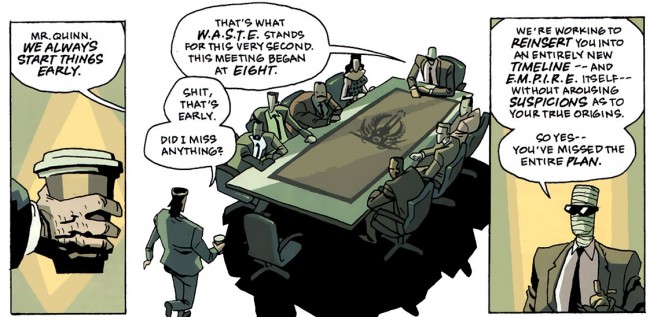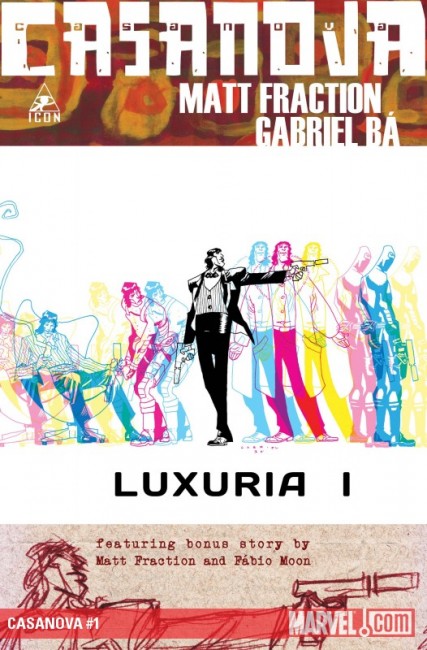
It Ain’t No More To It: Casanova & Growth
April 18th, 2011 Posted by david brothers(A brief explanation: I feel bored and weird and unsatisfied and like I need something new. It Ain’t No More To It is borrowed from a Biggie song where he drops in, busts a verse like that Schooly D joint, and gets out in 50-some seconds. So: I took a loose idea [in this case, talk about Casanova] and spent thirty minutes writing about it. No post-writing edits, either, beyond adding in images and links. This’ll be an ongoing thing, and eventually they might even get good.)
My man Sean has me thinking about Matt Fraction, Fabio Moon, and Gabriel Ba’s Casanova tonight.
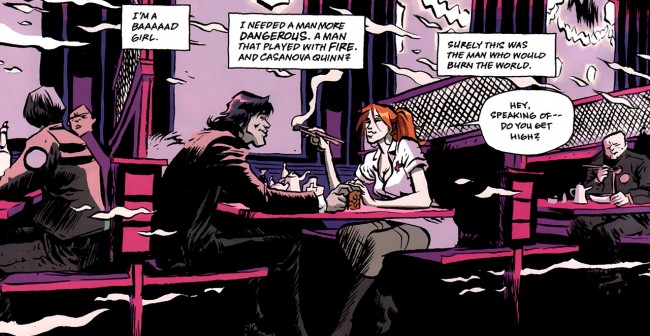
I read Casanova: Luxuria 1 and was turned off. I couldn’t put my finger on exactly why, but it felt see-thru. Ephemeral, light, full of nothing. References for references sake, and the backmatter actually grated. Having such an overwhelmingly negative reaction to Fraction, Moon, and Ba’s book was a huge surprise surprise to me. Years ago, Casanova was everything to me, a bright, shining beacon of what comics could be, something that ran counter to the mainstream superheroes that tended to turn to ashes in my mouth.
Casanova launched in 2006. Since then, I’ve been through several major life upheavals. I moved two thousand miles from home. I sold my car. I got a job with a salary. I started drinking. I quit drinking. I met girls, I forgot girls, and then met them again. Saying “Everything is different now” is probably hyperbole, but in a very real way, I’m not who I was five years ago. I’ve done a lot of changing and a lot of growing up.
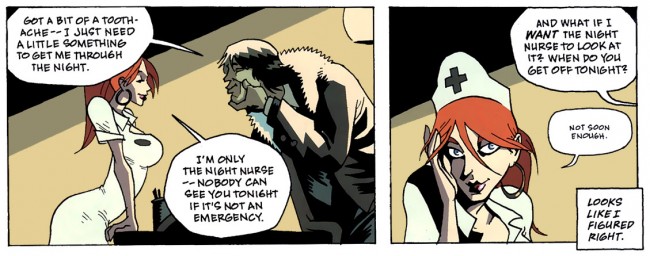
I get the Beatles, Blur, and David Bowie references in Casanova now. The story is different to me, though it’s the same story it’s always been. I’m different, and what was once revolutionary and mind-expanding is… just okay. Been there, learned what I needed to learn, and left it in the dust.
I used to love the backmatter in Casanova. It was like getting a guided tour behind the curtain, a personal connection between creator and consumer. It deepened my appreciation of the book, the way getting a glimpse of the person behind the pen tends to do, and it was something I wished more people would do. Bendis’s letters pages in Powers were a hot mess, but Casanova‘s text pieces clicked with me.
Part of it was that it served to make the book more clear. It made it plain that, yes, Casanova was about Jim Steranko comics and music and movies and sex, but it was also about Matt Fraction (and maybe to a lesser extent, the brothers Moon and Ba). It was his The Invisibles, a distillation of things he loves, hates, and fears put down onto the comics page. I could relate. Writing has always served as a way for me to work out issues (perhaps not always as well as I’d like) and crystallize my thoughts. Writing makes thoughts real. It creates realities. And reading Casanova felt like watching someone else work through that process.
The new backmatter struck me as the opposite. It felt like a flinch, like he’d touched a hot stove and drew back. It was alternately smug, infuriating, and annoying. The rejection of snark from Fraction felt fake, as did the “stop downloading and start uploading” tag in the indicia. It sounded like the old dichotomy of an artist up there, a reader down there, and if you’re one, you clearly aren’t the other, so man up and make something. And that grated.
I don’t think I’d realized how much I’ve changed until I read through Casanova: Luxuria. I say there were upheavals, but it was more like anything else. Brief bursts of growth that, when viewed in hindsight, were more gradual than they felt. I wonder if I was expecting Casanova to still have that revelatory effect that it had when it was fresh to me, and that’s why I had an allergic reaction to something I used to love?
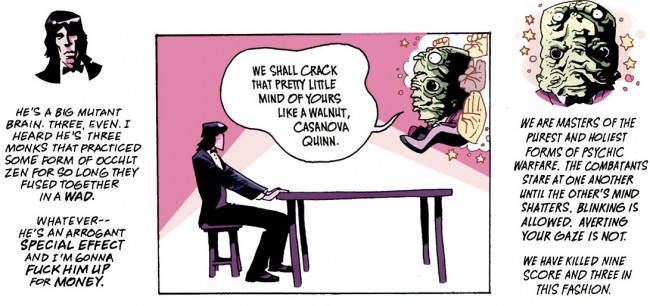
I can’t really call it. I’m different, Fraction’s different, and I’d come to terms with not really checking for his work until I read this essay by Sean Witzke. A character says, “I’m not doing this for you. I’m doing this for me. I don’t care about your expectations. So go fuck yourself, Doug. Fuck everybody. Fuck you.” Fraction often used to put overt examples of his voice into his characters, and this reads pretty plain to me.
And I liked it.
The story that followed clicked in a way that his Iron Man and Uncanny X-Men didn’t. It was weird and noodly and personal and all the things I originally came to love about Casanova. And that line, and Sean pulling the story apart on his autopsy table, convinced me to go back. I want to read the next volume of Casanova now. He’s ditching the backmatter, it looks like he’s telling the stories I want to read, and it feels right.
It won’t be the same, but that’s obvious. Things can only be revealed once. The Dark Phoenix saga is purple and bloated now. Miller’s Daredevil is an arrangement of cliches. Back then? They were the bomb. Now, they’re classics with caveats. So it’ll be nice to see where Fraction goes next. Claremont has pretty much kept pressing the same button for the entirety of his career–whether to maintain or refine, I do not know–and I can’t think of a single reason to pick up his comics now. Miller, on the other hand, has pushed himself forward with each project. For all the talk about how Miller only has one gimmick, you can’t look at his projects and go “This guy hasn’t learned anything or changed.” The Sin City projects are pretty different from each other, and All-Star Batman and Robin the Boy Wonder is an experiment with the grotesque that proves that he doesn’t stand still.
Fraction’s Marvel work went from being pretty good to losing me entirely. Almost all of Iron Fist and specific bits of The Order? They hold up pretty well. Iron Man? Tried to like it, wanted to like it, but Salvador Larocca’s art is garbage and I can’t get into the story. Uncanny X-Men has been adrift since Austen left. But the last eight pages of Casanova: Gula feel pretty good, like finding an old friend that grew up different than you expected, but no less interesting. So which one is Fraction going to be? Claremont or Miller? Stagnant or open to mutation?
It’s tough to tell. Five years is a long time, and in hindsight, I’m not too surprised my overwhelming enthusiasm for Casanova cooled. That’s natural, isn’t it? That’s how it’s supposed to be. If you’re still psyched about something you were into five years ago, you either need to consume more culture or stop being so excitable. Embrace the new. Learn something. That forces you to readjust and reconsider.
Which I think is absolutely a good thing. I may not love Casanova like I did, but I think I might be able to appreciate it more now. Back then, it was all about being fresh and shiny. Now, it’s more like seeing how the puzzle pieces of influence fit together to form a brand new whole.
